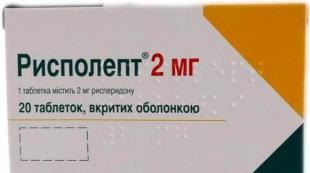The effect of hormonal drugs on the body. Violation of the amount of microelements. Types of hormonal pills
Hormonal contraception all over the world they are considered the most reliable in terms of protection against unwanted pregnancy. They are trusted by millions of women in civilized countries. They give freedom to choose the time of birth of the desired child, liberation in sexual relations, getting rid of some diseases and suffering. Subject to the rules of use hormonal contraceptives provide, without a doubt, high level reliability. IN last decade In our country, interest in this method of protection has also increased, but passions about the benefits and harms, advantages and disadvantages of their use do not subside.
How birth control pills work
Modern oral contraceptives may contain one or two hormones: progesterone and estrogen - then they are called combined, or only progesterone - the so-called mini-pills.Combined contraceptives are divided into drugs:
- with microdoses of hormones;
- with low doses;
- medium dose;
- With high doses hormones.
How do birth control pills work?
Birth control pills consist of synthetic hormones, which are analogues of female sex hormones produced in a woman’s body constantly during pregnancy. It is estrogen and progesterone that inhibit the production of other hormones that stimulate follicle maturation, due to which ovulation occurs. Therefore, by administering small doses of estrogen and progesterone with the tablet, it becomes possible to suppress or inhibit ovulation (egg maturation). The mechanism of action of all combined hormonal agents is based on this principle.The action of the “mini-pill” is based on the same principles, but the effective point here is the effect of the tablets on the structure of the uterine mucosa, and on the change in the viscosity of the secretion cervical canal. Thickening of the secretion and looseness of the endometrium does not allow sperm to fertilize the egg, and the egg itself does not allow itself to gain a foothold in the uterus.
All these phenomena disappear when you stop taking contraceptives. Reproductive function within two to three months it is restored, and the woman can have the desired pregnancy.
Birth control pills are almost 100% effective in preventing pregnancy when used correctly. At the same time, the use of these products regulates the menstrual cycle, relieves women from pain during menstruation and menstrual bleeding. Modern contraceptives eliminate the symptoms of premenstrual and menopausal periods, reduce the risk oncological diseases, stop unwanted growth facial hair, acne.
Does the effect of birth control pills decrease with alcohol consumption?
 Women, especially in at a young age, people often wonder how alcohol affects the reliability of birth control pills. Is it possible to take them together? Of course, this question is legitimate, because taking contraceptives can be long-term, but life is life, and no one is immune from circumstances when alcohol intake may occur.
Women, especially in at a young age, people often wonder how alcohol affects the reliability of birth control pills. Is it possible to take them together? Of course, this question is legitimate, because taking contraceptives can be long-term, but life is life, and no one is immune from circumstances when alcohol intake may occur. I always want to be sure of its effectiveness. contraception, and know what factors can reduce it. It is unlikely that anyone will be able to completely eliminate alcohol. And the instructions for contraceptive drugs often do not indicate that they cannot be combined with alcohol intake.
What to do if a festive feast is planned? If the celebration is scheduled for the evening, then taking the pill should be shifted three hours earlier or later. As a last resort, you can reschedule taking the pill until the morning, as if you forgot to take it, but then you need to follow the instructions for the drug exactly according to it. It is also necessary to see a gynecologist to rule out pregnancy.
According to WHO, the dose of alcohol should not exceed 20 mg of ethanol per day, if the need arises in combination with birth control pills. Moderation in drinking alcohol plays a big role in maintaining the effectiveness of contraceptives.
Side effects
The main disadvantages of birth control pills are their side effects on the body, which include:- Bloody spotting, especially common when starting to take the pills. After adaptation to the drug, as a rule, they disappear.
- Estrogens included in contraceptives can cause bloating, swelling of the lower extremities, fluid retention in the body, increased blood pressure, and migraine-like headaches.
- Progestins, on the contrary, cause irritability, nervousness, acne, and some weight gain.
- Weight gain may be associated with increased appetite when taking contraceptives. In some cases, this is due to fluid retention in the body.
- Sometimes birth control pills can cause dark spots on the face, reminiscent of characteristic spots during pregnancy. In this case, it is better to switch to another type of tablet.
- Such formidable ones may be caused vascular diseases like thrombosis. Their occurrence depends entirely on the dose of hormones in the product. The higher the dose of estrogen, the more risk development of vascular thrombosis.
- Smoking is prohibited while taking some contraceptives. U smoking women there is a risk of developing heart attacks and strokes.
- Taking combined oral contraceptives can cause attacks of cholelithiasis, and cause the formation of new stones in the bile ducts.
- Side effects may occur when oral contraceptives are combined with other medications: antibiotics, antifungals, etc.
What birth control pills help you get better?
 Modern contraceptives, which contain microdoses of hormonal components, do not cause weight gain.
Modern contraceptives, which contain microdoses of hormonal components, do not cause weight gain. But, in case wrong choice drug for a specific woman or girl, some weight gain is quite possible. Many women experience weight gain in the first two months of taking contraceptives, which is easily explained by the body’s adaptation. If your weight increases in the future, then you need to decide on switching to another type of pill.
The effect of contraceptives on fat metabolism has been well studied. Therefore, it is possible for each woman to choose a remedy that would not cause the above-mentioned side effects.
Bleeding while taking birth control pills
Bleeding when using birth control pills is a possible side effect. Bleeding can be either spotty or breakthrough.Spotting bleeding occurs in the first months of taking contraceptives. They are more often observed when using drugs with low hormone content than when using combined drugs. The reason is this: microdoses of hormones in the pill do not have time to accumulate in the body, and they are not enough to delay menstruation. This is a normal phenomenon, and it is not advisable to stop taking pills due to the appearance of spotting. The body will adapt and all functions will be restored.
In case of breakthrough bleeding we need to sound the alarm. It is better to immediately seek advice from a doctor who will conduct an examination to exclude ectopic pregnancy. inflammatory diseases, uterine fibroids, endometriosis.
What to do if bleeding occurs:
- Continue taking birth control as usual, or stop taking it within seven days.
- Contact the doctor. Your doctor may prescribe additional tablets with high content progestins.
- If bleeding continues, a blood test must be taken to rule out anemia. For anemia, iron supplements are prescribed.
Vaginal discharge
Are women often concerned about an increase in vaginal discharge? and associate them with the use of birth control pills.By the way, vaginal discharge are found in every woman, but normally they are odorless, transparent in appearance and insignificant.
In case of violation menstrual cycle you need to see a doctor who will tell you what to do. Establishing a cycle duration of 21-36 days is considered the norm.
Helps with mood changes herbal tea with common twig, which affects the level of testosterone in the body.
Skin problems such as acne, oily hair, their greasyness? talk about an imbalance of hormones in the female body. In this case, combined oral contraceptives with antiandrogenic action are selected.
Doctors believe that it is better to stop taking the pills two to three months before the planned conception. However, it should be borne in mind that the likelihood of conception increases already in the first month after discontinuation of the contraceptive.
How to take birth control pills correctly?
 It is better to start taking contraceptives on the first day of your period - only then the pills take effect immediately. If taken on the fifth day of menstruation, apply additional measures protection. Women with irregular periods can start taking contraceptives on the first day of their cycle, confident that they are not pregnant.
It is better to start taking contraceptives on the first day of your period - only then the pills take effect immediately. If taken on the fifth day of menstruation, apply additional measures protection. Women with irregular periods can start taking contraceptives on the first day of their cycle, confident that they are not pregnant. In the absence of lactation, it is better to start taking it 21 days after birth. At breastfeeding Taking oral contraceptives should be postponed for six months.
After an abortion, it is necessary to start using birth control pills on the day of the abortion.
Standard regimen for hormonal contraceptives
The drug is taken daily for 21 days, followed by a seven-day break, then continues to be taken from a new package. Menstrual-like bleeding goes away during a break from taking the pills.
Special Modes
The 24+4 mode is typical for the contraceptive Jess, the package of which contains 24 hormonal and 4 inactive tablets. The tablets are used daily, without breaks.
Extended mode
It consists of taking a product containing only “active” tablets (continuously, more than one package). A three-cycle regimen is common - taking 63 tablets of monophasic drugs followed by a 7-day break.
Thus, the number of menstrual bleeding per year is reduced to four.
What to do if you forgot to take your pill?
The basic rule in case of missing a pill:1. Take the missed pill as soon as possible!
2. Take the remaining tablets at your usual time.
If one or two tablets are missed or not started new packaging within one to two days
Take a pill. There is a risk of pregnancy.
Missing three or more tablets in the first 2 weeks of use, or not starting a new pack within three days
Take a pill. Apply barrier methods contraception for 7 days. If sexual intercourse has taken place within 5 days, use emergency contraception.
Skipping 3 or more tablets during the third week of use
Take the pill as soon as possible. If the package contains 28 tablets, do not take the last seven tablets. Don't take a break. Use barrier methods of contraception for 7 days. If sexual intercourse has taken place within 5 days, use emergency contraception.
When do birth control pills start working?
At correct technique The tablets begin to act immediately after the start of the course.How to choose the right drug for nulliparous and parous women?
 To the young, nulliparous women Microdosed birth control pills are more often prescribed. Such drugs as Lindinet -20, Jess, Logest, Mercilon, Qlaira, Novinet are ideal for them.
To the young, nulliparous women Microdosed birth control pills are more often prescribed. Such drugs as Lindinet -20, Jess, Logest, Mercilon, Qlaira, Novinet are ideal for them. Low-dose and medium-dose hormonal drugs are suitable for women who have given birth. These include: Yarina, Marvelon, Lindinet-30, Regulon, Silest, Janine, Miniziston, Diane-35 and Chloe.
Features of contraception depending on the woman’s age
Selecting birth control pills is a difficult task that can be solved together with your doctor. The goal of the task is reliable protection against attack unwanted pregnancy. The criteria may be effectiveness, absence of side effects, ease of use of the pills and speed of restoration of fertility after discontinuation of the contraceptive.Undoubtedly, the choice of contraceptive drug depends on age characteristics.
At what age can you take birth control pills?
The periods of a woman’s life are divided into adolescence - from 10 to 18 years, early reproductive - up to 35 years, late reproductive - up to 45 years, and perimenopausal - lasting 1-2 years from the last menstruation.It is advisable to start contraception at adolescence, if, of course, there is a need for it. IN last years There is a decrease in the age of first pregnancy and childbirth, and the frequency of abortions at a young age is increasing.
According to WHO, the most effective for adolescents are combined oral contraceptives containing small doses of steroids and third-generation drugs containing progestogens. Three-phase drugs are best suited for adolescents: Triziston, Triquilar, Tri-Regol, as well as single-phase drugs: Femoden, Mercilon, Silest, Marvelon, which regulate the course of the menstrual cycle.
Birth control pills for young girls
Between the ages of 19 and 35, women can use all known methods of contraception. However, it should be borne in mind that the use of combined oral contraceptives is more reliable and effective.In addition to oral contraceptives, other methods are popular in our country: insertion of an intrauterine device, use of a condom, use injection methods contraception.
It has been proven that birth control pills are used not only for contraception, but also for medicinal and for preventive purposes for diseases such as infertility, inflammatory and oncological diseases, menstrual irregularities. The only drawback that you need to be aware of is that hormonal contraceptives do not protect a woman from sexually transmitted infections.
The most common remedies at this age are Janine, Yarina, Regulon.
Which birth control pills are best to take after 35 years of age?
Doctors say that at this age women should protect themselves from unwanted pregnancy by using intrauterine devices, because At this age, steroids, due to the presence of diseases acquired by the woman, are contraindicated.A woman may suffer from cervical diseases, endometriosis, endocrinological diseases - diabetes mellitus, thyrotoxicosis, obesity. Many women smoke. These factors complicate the selection of hormonal contraceptives.
Steroids are prescribed only if there are no contraindications. Combination birth control pills are preferred latest generation And triphasic drugs: Femoden, Triziston, Silest, Triquilar, Marvelon, Tri-regol.
For this group of women, products with a low content of hormones, as well as “mini-pill” preparations, are excellent. Hormonal contraception is combined with therapeutic effect new generation drugs. The most popular of them is Femulen. It can be used if a woman has diseases such as thrombophlebitis, previous heart attack and stroke, hypertension, severe migraine-type headaches, and some gynecological diseases.
Which birth control pills are suitable for women over 45?
 After 45 years, ovarian function gradually decreases, the likelihood of pregnancy decreases, but is still possible. Many women at this age are still ovulating, and fertilization of the egg can occur.
After 45 years, ovarian function gradually decreases, the likelihood of pregnancy decreases, but is still possible. Many women at this age are still ovulating, and fertilization of the egg can occur. Undoubtedly, a woman is able to become pregnant and give birth to a child, but pregnancy often occurs with complications, since at this age there is enough large bouquet various diseases. Diseases of the cardiovascular system, liver and kidneys are usually present, chronic disorders functions of the reproductive system. All factors can serve as contraindications for the prescription of hormonal contraceptives. Smoking and the presence of others bad habits also complicates the use of birth control pills.
Very often, by the age of 40, women no longer plan a pregnancy, and unwanted pregnancies are artificially terminated. Abortion, especially during this period, has consequences that threaten a woman’s health. Frequent complications abortion are considered to be the development of uterine fibroids, cancer, severe manifestations menopause. The possibility of developing diseases indicates the need for contraception during this period.
Birth control pills are also prescribed for many gynecological diseases, osteoporosis, and to prevent the development of ovarian and uterine cancer.
At the age of over 45 years, it is promising to use low-dose hormonal drugs, mini-pills, injections and implants that are implanted under the skin (for example, Norplant).
Combined-action contraceptive pills are contraindicated in women over 45 years of age in the following cases:
- if a woman smokes;
- if a woman suffers from heart and vascular diseases - heart attack, stroke, thrombosis;
- with type 2 diabetes mellitus;
- in case of severe liver diseases with the development of liver failure;
- for obesity.
Effect of birth control pills
For pregnancy
When taking hormonal contraceptives, pregnancy is quite possible if a woman takes the pills incorrectly or the regimen for taking them is disrupted. If pregnancy is suspected or established, the drug must be discontinued immediately.Taking hormonal drugs in the first three weeks of pregnancy does not have any effect negative influence on the condition of the fetus and the health of the woman.
Overall for the body
Hormonal contraceptives have different effects on a woman’s body. In order to promptly identify side effects of contraceptives, a woman taking these drugs is required to consult with her doctor twice a year. Contraceptives can affect the vaginal microflora. This influence manifests itself various symptoms. Some people develop signs of thrush (bacterial vaginitis) because taking medications containing gestagens leads to a decrease in the level of lactobacilli in the vagina. In this case, it is possible to discontinue the pills until the estrogen level is restored and the symptoms disappear.For the development of mastopathy
Women often ask the question: can birth control pills cause mastopathy?Experts say that with the correct choice of birth control pills and the correct regimen for their use, mastopathy cannot develop. Another thing is when a woman has hormonal imbalances, there are chronic gynecological diseases, diseases of the liver, kidneys, and adrenal glands. Violation hormonal balance, stress, depression, abortion, trauma to the mammary gland can lead to mastopathy.
Contraception should only be selected by a doctor. The doctor must take into account all the characteristics of a particular woman, her state of health, age, heredity, phenotype, presence of bad habits, lifestyle, sexual activity. If the drug is selected incorrectly, without a doubt, the risk of developing mastopathy increases.
Reception hormonal drugs it is important to start only after consultation and examination by a specialist - in this case you will avoid undesirable consequences and possible complications.
Do birth control pills help with menopause and androgenetic alopecia?
An effective treatment for women during menopause and with androgenetic alopecia can be tablets and creams containing estrogen and progesterone.Is it possible to leave without a doctor's prescription?
Birth control pills are prescription drugs and can only be prescribed by a doctor. The law does not prohibit the sale of hormonal contraceptives without a prescription. But only a doctor can help you choose the right method and means of contraception.What is the effect of birth control pills on a woman’s body? Having decided to protect themselves from unwanted pregnancy, many girls choose hormonal contraception. However, before deciding to start taking hormonal pills, they are interested in what changes will occur in their body, and what is the effect of contraceptives on the body... Let's talk about it.
The principle of contraceptive action on a woman
Birth control pills contain small doses of female sex hormones – estrogen and progesterone (gestagen), which cause a number of changes in a woman’s body. What is the effect of the tablets?
Not all girls know this, but hormonal contraceptives (hormonal contraceptives) have three phases of protection against pregnancy. The first, most important stage is that they prevent the release of eggs from the ovaries for fertilization. Sometimes at this stage a failure may occur, that is, a mature egg in in rare cases can still move to fallopian tube, where fertilization by sperm usually occurs. For this, a condition is necessary - male reproductive cells must freely penetrate the woman’s fallopian tube.
This is where the second line of defense comes into play - under the influence of hormones cervical mucus girls become viscous, sperm simply cannot get through such a barrier fallopian tubes, where they will meet with the egg. However, even in this scenario, failure may occur. If the most active and tenacious sperm can penetrate through thick mucus to the egg and fertilize it, the last of the planned, third, protection options will work.
When taking birth control pills, the mucous membrane of the uterine cavity changes, it becomes loose, which makes it unfavorable soil for the implantation of an embryo. That is, the fertilized egg, having descended into the uterine cavity, will not be able to gain a foothold in the endometrial layer, which means that at this stage the pregnancy will end. Everything seems to be fine, but here it’s worth thinking about what effect these pills have on a woman’s body in terms of her health?
Positive effects of hormonal contraceptives on women
Thanks to taking GC, a girl can lead a normal life. sex life without fear of getting pregnant. Many modern drugs significantly improve the quality of the menstrual cycle, making it regular and the periods themselves painless. With all this menstrual flow become scarce and short-lived, so they cause almost no inconvenience to women. At their discretion, girls can either delay the approach of menstruation or bring its onset closer.
Having started taking birth control pills, many girls note a weakening of premenstrual syndrome - their mammary glands do not become engorged, and their mood remains at the same level. Drugs such as Yarina help relieve swelling, as well as moderate production sebum. Thanks to this it disappears acne and the condition of hair and nails improves. The positive effect of GCs also lies in the fact that their use helps reduce blood loss during menstruation, and the hemoglobin level is normalized.
It is known that even after short-term use of birth control pills (for 3-6 months) and their subsequent cancellation, it is much easier for girls to get pregnant. Thanks to these pills, the function of the ovaries is inhibited, and when they are stopped, the ovaries work more vigorously and stably. It is not for nothing that couples who cannot get pregnant for a long time are recommended this method. A woman takes hormonal contraceptives, then stops taking them, and over the next 2-3 months the long-awaited pregnancy almost always occurs.
Negative effects of birth control pills on a woman and her health
The Civil Code has and negative sides. For example, if an incompetent doctor prescribed them to a girl, without taking into account the characteristics of her health, without taking into account her anamnesis and her habits, the pills can lead to serious problems with health. The thing is that GCs, which are taken orally, have an effect on cardiovascular system.
If a girl has problems with her veins, for example, thrombophlebitis, then birth control pills are contraindicated for her. When taken, the blood becomes thicker, clots can form in it, and this leads to thrombosis and other health problems. GCs are also not recommended for women who smoke, since the simultaneous use of nicotine and pills significantly increases the load on the heart.
There is information that girls who take birth control pills for a long time are at greater risk of developing breast and cervical cancer. Those at particular risk are those diagnosed with cervical erosion. All these features must be taken into account by the doctor prescribing the pills.
Birth control pills certainly benefit healthy women by helping them cope with premenstrual syndrome, mood swings, make you more comfortable critical days. However, if you have certain diseases, it is better to abstain from them, since the harm from taking them will exceed the benefits. You should never prescribe these pills yourself, because you don’t know whether they will suit you and what consequences they may lead to.
Hormonal drugs are called a group medicines, used for hormone therapy and containing hormones or their synthesized analogues.
The effect of hormonal drugs on the body has been studied quite well, and most studies are freely available to a wide range of readers.
Distinguish hormonal agents containing hormones natural origin(they are made from the glands of slaughter cattle, urine and blood of various animals and humans), including plant, and synthetic hormones and their analogues, which, naturally, differ from natural ones in their chemical composition, however, produce the same physiological effect on the body.
Hormonal agents are prepared in the form of oil and water compositions for intramuscular or subcutaneous administration, as well as in the form of tablets and ointments (creams).
Effect
Traditional medicine uses hormonal drugs for diseases that are associated with insufficient production of certain hormones human body, for example, deficiency of insulin in diabetes, sex hormones - with reduced ovarian function, triiodothyronine - with myxedema. This therapy is called replacement therapy and is carried out over a very long period of the patient’s life, and sometimes throughout his entire life. Also, hormonal drugs, in particular those containing glucocorticoids, are prescribed as antiallergic or anti-inflammatory drugs, and mineralocorticoids are prescribed for myasthenia gravis.

Important female hormones
A very large number of hormones “work” in the female body. Their coordinated work allows a woman to feel like a woman.
Estrogens
These are “female” hormones that stimulate the growth and function of the female genital organs and the growth of the mammary glands. In addition, they are responsible for the appearance of female secondary sexual characteristics, i.e., breast enlargement, fat deposition and the formation of female-type muscles. In addition, these hormones are responsible for the cyclicity of menstruation. They are produced by the ovaries in women, the testes in men, and the adrenal cortex in both sexes. These hormones influence bone growth and water-salt balance. After menopause, women have less estrogen. This can lead to hot flashes, sleep disturbances and organ atrophy genitourinary system. Also, a lack of estrogen can be a cause of osteoporosis that develops in postmenopause.
Androgens
Produced by the ovaries in women, the testes in men, and the adrenal cortex in both sexes. These hormones can be called “male” hormones. In certain concentrations, they cause in women the development of male secondary sexual characteristics (deepening of the voice, growth of facial hair, baldness, height muscle mass"in the wrong places") Androgens increase libido in both sexes.
A large amount of androgens in the female body can lead to partial atrophy of the mammary glands, uterus and ovaries and infertility. During pregnancy, under the influence of excess amounts of these substances, a miscarriage may occur. Androgens can reduce the secretion of vaginal lubrication, making sexual intercourse painful for the woman.
Progesterone
Progesterone is called the “pregnancy” hormone. It is produced yellow body ovaries, and during pregnancy also the placenta. Progesterone helps maintain pregnancy, stimulates the development of the mammary glands and “prepares” the uterus for bearing a fetus. During pregnancy, its level increases 15 times. This hormone helps to obtain the maximum amount nutrients from what we eat and increases appetite. During pregnancy it is very useful qualities, but if its formation increases at other times, this contributes to the appearance of extra pounds.
Luteinizing hormone
Produced by the pituitary gland. It regulates the secretion of estrogen by the ovaries in women, and is also responsible for ovulation and the development of the corpus luteum.
Follicle-stimulating hubbub
Synthesized by the pituitary gland. Stimulates the growth and maturation of ovarian follicles, estrogen secretion and ovulation. Gonadotropic hormones (FSH - follicle-stimulating hormone, LH - luteinizing hormone and prolactin), produced in the adenohypophysis, determine the sequence of maturation of follicles in the ovary, ovulation (the release of the egg), the development and functioning of the corpus luteum."
Prolactin
This hormone is also produced by the pituitary gland. In addition, the mammary gland, placenta, central nervous system and the immune system. Prolactin stimulates the growth and development of the mammary glands and is involved in the formation of maternal instinct. It is necessary for lactation, increases milk secretion and converts colostrum into milk.
This hormone prevents the occurrence new pregnancy while breastfeeding your baby. It is also involved in providing orgasm and has an analgesic effect. Prolactin is called a stress hormone. Its production increases with stressful conditions, anxiety, depression, severe pain, with psychoses, action unfavorable factors from outside.
All these hormones are very important for proper operation woman's body. They allow the female body to function normally.

Features of hormonal drugs
Such a broad concept as “hormonal drugs” includes various medications:
- Contraceptives.
- Treatments (drugs that cure diseases, for example, somatotropin in childhood treats dwarfism caused by its deficiency).
- Regulatory ( various tablets to normalize the menstrual cycle or hormonal levels).
- Supportive (insulin for diabetics).
They all have different effects on a woman’s body.
Contraceptives
Without contraceptives, it is difficult to avoid unwanted pregnancy, but constantly use condoms or other mechanical methods protection may be inconvenient. Therefore, many drugs have been developed for the fairer sex, the use of which does not cause pregnancy.
Most often, the effect of contraceptives is that they prevent the egg from attaching to the walls of the uterus, so the development of the fetus becomes impossible. The use of contraceptives in the form of pills is popular today, but along with the positive qualities, there are also negative consequences for the woman’s body:
- menstrual irregularities (due to incorrect selection of the drug);
- swelling and weight gain (due to the body not taking medications);
- hair loss, brittle nails and dry skin (due to improper selection);
- lethargy, bad feeling, decreased libido.
But all these qualities in 90% of cases manifest themselves due to incorrect or independent selection of contraceptives. Such serious drugs Only a gynecologist can choose, because for this it is necessary to analyze the woman’s hormonal data. Do not prescribe under any circumstances oral agents protection on their own, because if some contraceptives don’t make one girl feel bad, this does not mean that they will suit others.
But not everyone can use this method of protection.
There are several contraindications for the use of hormonal contraceptives:
- presence of problems with the background;
- taking antibiotics;
- pregnancy;
- problems with the cardiovascular system;
- age less than 17 years;
- excess weight and allergic reactions.
During the period of such protection, the chronic diseases. Discuss all the details with your doctor or gynecologist before you start taking contraceptives.
Side effects
In the instructions for hormonal contraceptives it is sometimes indicated as a side effect. mental disorders. These are usually depression and anxiety disorders. Attacks of fear or panic attacks They are not always indicated separately because they are often reduced simply to anxiety disorders. Although they deserve special attention and can greatly ruin the life of a woman who uses contraceptives. According to research conducted by the Royal Society of General Practitioners, women taking hormonal contraception have an increased risk of mental illness, neurotic depression (10-40%), development of psychosis, suicide. Aggression increases, and changes in mood and behavior are noted. It is possible that this factor has a significant impact on the life of the family and society.
Considering that women’s mood is influenced even by normally observed fluctuations in levels endogenous hormones during the menstrual cycle (for example, according to data from France and England, 85% of crimes committed by women occur during their premenstrual period) it becomes clear why aggressiveness and depression increase by 10-40% when taking GC.
Under the influence of contraception, the level of the hormone testosterone, which is responsible for sexuality, is significantly reduced. Women taking hormonal contraceptives often complain of a lack of desire, lack of sexual desire, and difficulty achieving orgasm. It is known that with long-term use of hormonal contraceptives, irreversible changes in the area of sexuality and libido can occur. By blocking testosterone in completely young girls Those using contraceptives experience sexual coldness and often anorgasmia.
Special attention When taking hormonal contraceptives, you should pay attention to the following recommendations:
- pills intended to protect against unwanted pregnancy do not protect the female body from sexually transmitted diseases;
- women over 35 years of age when taking combined contraceptive pills you should stop smoking, as in this case the risk of vascular blockage increases significantly;
- It is not advisable to use tablets during breastfeeding combined composition, since estrogen in their composition affects the quality and composition of milk. IN in this case tablets containing only the corpus luteum hormone are prescribed;
- if nausea, dizziness, or stomach upset occur, you should consult a specialist;
- in case you are prescribed medications, you must inform your doctor that you are taking hormonal contraceptives;
- if there is a miss in taking pills, then there is a need to use additional contraceptives, for example, condoms;
- for women with severe forms endocrine diseases, For example, diabetes, as well as those with pathology of the heart and blood vessels, neoplasms, taking oral contraceptives is undesirable.
Treating
This group treats the body from diseases and disorders. Such hormonal preparations can be in the form of tablets or external use. The former are used to treat serious diseases caused by hormonal imbalances. The latter affect more locally, at the places of use.
Often, girls synthesize few hormones responsible for the synthesis of new cells, so cracks or bleeding wounds appear on the skin, especially in winter, and do not heal. To treat them, a dermatologist may prescribe a cream, ointment, or lotion with certain hormones.
Ointments often contain corticosteroids, which, when applied to the skin, are absorbed into the blood within a few hours and begin to act. How does this group affect the body? This issue should be taken seriously, because the medications that are used most require attention when prescribing, determining the dosage and duration of the course, because the wrong step will cause complications of existing disorders.

Regulatory
Due to the crazy pace of life, daily poor nutrition, bad habits, sedentary image life and newfangled diets, women often suffer from menstrual irregularities. This negatively affects the development of the reproductive system, general condition body, increases the risk of developing breast cancer, and can also cause infertility. But there is a solution to this problem, because most often the cycle goes wrong due to changes in hormonal levels.
Therefore, a detailed blood test is taken for these substances. Similar procedures They are not cheap, because working with hormones is very difficult, but remember: treating the consequences of disorders will cost much more, so take care of your body in a timely manner.
After identifying specific hormones that are either deficient or in excess, a course of medications is prescribed to regulate their levels. These could be pills or injections. Often, gynecologists prescribe oral contraceptives to normalize the menstrual cycle. Don't be afraid, they are not trying to deceive or make things worse. Depending on test results, some hormonal remedies actually improve menstruation without causing negative consequences. The influence of regulatory agents depends on the correctness of their selection and dosage, because active substances are required by the body in the smallest doses, so it is very easy to go beyond the norm. For example, if you overdo it with progesterone injections when there is a lack of it, you may experience swelling, nausea, hair loss and painful sensations in the mammary glands.
Supporters
These pills or injections keep the body normal if diseases or disorders can no longer be cured. This may be due to chronic diseases, constant failures, poor functioning of endocrine organs and others. For example, without insulin injections, a diabetic can die within a few days, even if he does not eat sweets.
Thyroxine tablets may stop the development of myxedema in people with dysfunction thyroid gland.
These drugs can often cause harm:
- loading the gastrointestinal tract;
- irritating the mucous membranes of the stomach or intestines;
- causing hair loss or other unpleasant symptoms.
But it is impossible to refuse them, because these are the drugs that keep the patient alive.
Hormonal drugs have a profound effect on a woman’s body, especially if they are oral contraceptives or regulating agents. Therefore, remember that only a specialist can prescribe them after detailed analyzes. Tablets, injections, ointments and other medications with hormones often disrupt the functioning of the digestive system, excretory system, may cause weakness, so consult your doctor if you experience such symptoms.
Common Myths
- Hormonal drugs are very harmful to health and should not be used under any circumstances. This is an erroneous opinion. Hormonal drugs have a diverse systemic effect on the body, and, like any other medicine, can cause side effects. However, abortion, from which these drugs protect almost 100 percent, is much more dangerous for a woman’s health.
- I will take the hormonal medications that helped my friend (sister, acquaintance). I should not self-prescribe hormones (like any other medications). These drugs are prescription drugs and should only be prescribed by a doctor after an examination, taking into account all the characteristics of your body (which, by the way, may be completely opposite to the characteristics of the body of your friend or even relative).
- Hormonal drugs should not be used by nulliparous women and girls under 20 years old. This is a completely erroneous opinion. Hormonal contraceptives can be used even by adolescents, especially if it is necessary to achieve a certain therapeutic effect.
- After using hormones for a long time You don’t have to be afraid of getting pregnant. Not at all. Already a month after finishing taking the drugs, it becomes possible to get pregnant, and even give birth to twins or triplets, since 2-3 eggs mature in the ovary. Some forms of infertility are treated by prescribing contraceptives for 3-4 months.
- After a certain time (six months, a year, etc.) you should take a break from taking hormonal drugs. This opinion is erroneous, since breaks in taking the drug do not affect either the appearance (or non-occurrence) of complications or the ability to bear children after taking medications. If there is a need and, in the opinion of the doctor, there are no contraindications to constant use, hormonal drugs can be used continuously and for as long as desired.
- Nursing mothers should not take hormones. This statement is only true for some pills that affect lactation. However, there are tablets containing only a small amount of the hormone that do not affect lactation. You just need to remember that these tablets must be used strictly every 24 hours continuously. Even the slightest deviation from reception hours completely destroys contraceptive effect of this drug.
- Hormonal pills can make you gain a lot of weight. Hormonal pills do have an effect on appetite, but for some it increases and for others it decreases. It is impossible to predict exactly how the drug will affect you. If a woman tends to be overweight or if her body weight increases while taking it, the doctor prescribes drugs with a low content of gestagens, which are responsible for weight gain.
- Hormonal drugs are created only to prevent pregnancy in women; there are no drugs of this kind for men. This is wrong. Hormonal drugs are drugs obtained synthetically and acting like natural hormones produced in our body. These types of drugs do not necessarily have contraceptive effect, and can be prescribed to both women and men (depending on the type of drugs) to normalize the function of the reproductive system, normalize hormonal levels, etc.
- Only very severe diseases are treated with hormonal drugs. Not necessary. In the treatment of some mild diseases, hormonal drugs are also prescribed. For example, when thyroid function decreases, thyroxine or euthyrox is used.
- Hormones accumulate in the body. Erroneous opinion. Once in the body, hormones almost immediately break down into chemical compounds, which are then excreted from the body. For example, birth control pill is destroyed and “leaves” from the body within 24 hours: that is why it needs to be drunk every 24 hours. After the end of taking hormonal drugs, the effect of their influence is maintained not due to the accumulation of drugs in the body, but due to the fact that hormones act on various organs(ovaries, uterus, mammary glands, parts of the brain), normalizing their work.
- Pregnant women are not prescribed hormonal medications. If a woman had hormonal disorders before pregnancy, then during pregnancy she needs medicinal support so that the production of female and male hormones was normal, and the child developed normally. Hormones (for example, adrenal hormones) are also used if the hormonal balance of a woman’s body is disrupted during pregnancy.
- In any case, hormonal drugs can be replaced with other drugs. Unfortunately, this is not the case. In some situations, hormonal drugs are irreplaceable (for example, if a woman under 50 has had her ovaries removed). And sometimes hormonal treatment prescribed by a neuropsychiatrist (for example, for depression).
This is a group of drugs that are used for hormone therapy. The effect of such drugs on the body has been studied well enough that it does not cause concern.
Such a broad group as hormonal drugs includes the following categories of drugs:
- Contraceptives.
- Medicinal (drugs whose action is aimed at curing a disease caused by a deficiency of the hormone).
- Regulating (for example, to normalize the menstrual cycle).
- Maintenance (insulin for diabetics).
All drugs affect the body and women differently. It all depends on the general condition of the body, the presence of serious diseases and the state of the immune system.
Treatment drugs
This group is used for hormonal therapy and is available in the form of tablets and ointments. Tablets treat serious illnesses caused by hormonal imbalances, and ointments have a local effect.
In girls experiencing a lack of hormone production, the skin suffers from cracks and wounds in the winter, as the synthesis of new cells is disrupted. To deal with such trouble. The doctor prescribes creams, ointments and lotions containing hormones. Typically, ointments contain corticosteroids, which are absorbed into the blood within a few hours.
Such drugs can seriously affect the body. Therefore, it is important to maintain the dosage and, when prescribing, immediately determine the duration of the course, since one wrong step can lead to complications of existing problems.
Regulatory drugs
Due to the characteristics of the lifestyle modern woman, deteriorating nutrition and polluted environment, many representatives of the fair sex experience menstrual irregularities. This can affect not only the sexual sphere of the body, but also the general condition of the body. Hormonal disorders can lead to the development of breast cancer, as well as infertility. The action of hormonal drugs can help solve problems. 
However, before taking it, examination and tests are necessary. First, a blood test is performed for certain substances. He will be able to identify either their excess. Such tests are quite expensive, but to solve problems it is necessary to start treatment in a timely manner. After identifying a deficiency or excess of hormones, regulation of their content begins. For this, courses of injections or tablets are prescribed. Properly selected oral contraceptives will help normalize the cycle without harm to health.
Any product containing hormones requires scrupulousness in determining the dosage, since going over the line required dose simple enough. For example, exceeding the norm can lead to hair loss, swelling and pain in the mammary glands.
Hormonal preparations can be made from naturally occurring hormones or they can be synthetically produced substances. When a course of hormonal therapy is aimed at normalizing hormonal levels and normalizing metabolic processes. Depending on the functional state of one or another gland, hormone therapy is conventionally divided into replacement, stimulating and blocking.
Negative effects of hormones
For the body of both men and women, the use of hormonal drugs can cause such unpleasant consequences, How:
- osteoporosis and mucosal ulcers duodenum and the stomach itself when taking glucocorticoids;
- weight loss and cardiac arrhythmia when taking thyroid hormones;
- too much a sharp decline blood sugar when taking insulin.

The effect of hormonal ointments on the body
Preparations containing topical hormones can vary greatly in the degree of effect on the body. Ointments and creams are considered the most powerful; gels and lotions contain lower concentrations. Hormonal ointments used to treat skin diseases and allergic manifestations. Their action is aimed at eliminating the causes of inflammation and irritation on the skin.

However, if you compare ointments with tablets or injections, then their harm is minimal, since absorption into the blood occurs in small doses. In some cases, the use of ointments can lead to a decrease in the productivity of the adrenal glands, but after the end of the course of treatment, their functionality is restored on its own.
The effect of hormonal contraceptives on a woman’s body
The peculiarities of the influence of hormonal drugs on the human body are that many factors are perceived purely individually. The use of such drugs is not only an interference with natural physiological processes, but also influence on the functioning of body systems during the day. Therefore, the decision to prescribe hormonal drugs can only be made by an experienced doctor based on the results comprehensive survey and analyses.
Hormonal contraceptives can be produced in various forms and dosages:
- combined;
- mini-pill;
- injections;
- plasters;
- subcutaneous implants;
- postcoidal drugs;
- hormonal rings.

Combination drugs contain substances similar to female hormones produced by the ovaries. To be able to select the optimal medicine, all groups of drugs can be monophasic, biphasic and triphasic. They differ in the proportions of hormones.
Knowing about the properties of gestagens and estrogens, we can identify certain mechanisms of action of oral contraceptives:
- reduction in the secretion of gonadotropic hormones due to the effects of gestagen;
- increased vaginal acidity due to the influence of estrogens;
- increased viscosity of cervical mucus;
- Each instruction contains the phrase “ovum implantation,” which is a veiled abortifacient drugs.
Since the advent of the first oral contraceptives, debates about the safety of the drugs have not subsided, and research in this area continues.
What hormones are included in contraceptives?
Typically, hormonal contraceptives use progestogens, also called progestins or progestogens. These are hormones that are produced by the corpus luteum of the ovaries, in small quantities by the adrenal cortex and during pregnancy by the placenta. The main gestagen is progesterone, which helps prepare the uterus in a state favorable for the development of a fertilized egg.

Another component of oral contraceptives is. Estrogens are produced by ovarian follicles and the adrenal cortex. Estrogens include three main hormones: , estriol and estrogen. These hormones are necessary in contraceptives to normalize the menstrual cycle, but not to protect against unwanted conception.
Side effects of hormonal drugs
Each drug has a number of side effects that may occur; when these occur, a decision is made to immediately discontinue the drug.
The most frequently reported cases of side effects of hormonal drugs are:
- Hemolytic-uremic syndrome. It manifests itself with disorders such as anemia, thrombocytopenia and acute renal failure.
- Porphyria, which is a disorder of hemoglobin synthesis.
- Hearing loss due to otosclerosis.

All manufacturers of hormonal drugs indicate thromboembolism as a side effect, which is extremely rare. This condition is a blockage of a blood vessel by a blood clot. If the side effects outweigh the benefits of the medication, it should be discontinued.
Side effects of oral contraceptives are:
- (lack of menstrual flow);
- headache;
- blurred vision;
- changes in blood pressure;
- depression;
- weight gain;
- soreness in the mammary glands.

Studies on side effects of oral contraceptives
Research is constantly being conducted in foreign countries about side effects hormonal drugs on the woman’s body, which revealed the following facts:
- Hormonal contraceptives are used by more than 100 million women in different countries.
- Number of deaths from venous and arterial diseases recorded from 2 to 6 per year per million.
- Risk venous thrombosis important for young women
- Arterial thrombosis is relevant for older women.
- Among smoking women taking OCs, the number deaths is about 100 per million per year.

The influence of hormones on the male body
The male body is also seriously dependent on hormones. A man's body also contains female hormones. Violation of the optimal balance of hormones leads to various diseases.
Either estrogen leads to a decrease in testosterone production. This can cause problems:
- in the cardiovascular system;
- with memory;
- age;
- decreased immunity.
If the balance of hormones is disturbed, a course of hormonal therapy is necessary to help avoid further deterioration of health.

Progesterone affects male nervous system calming effect and helps men suffering from premature ejaculation, solve sexual problems.
The normal content of estrogen in the male body has a number of beneficial properties:
- preservation optimal level"good cholesterol";
- pronounced muscle growth;
- regulation of the nervous system;
- improvement of libido.

When noted:
- suppression of testosterone production;
- female-type fat deposits;
- gynecomastia.
- Erectile dysfunction;
- decreased libido;
- depression.
Any of the symptoms is extremely unpleasant, so do not hesitate to visit a doctor. A competent specialist will be able to carry out full examination and prescribe a course of medications that will significantly improve the condition of the body.
Bibliography
- Sudakov K.V., Normal physiology. - M.: Medical Information Agency LLC, 2006. – 920 p.;
- Kolman Y., Rem K. - G., Visual biochemistry // Hormones. Hormonal system. - 2000. - pp. 358-359, 368-375.
- Berezov T.T., Korovkin B.F., Biological chemistry // Nomenclature and classification of hormones. - 1998. - p.250-251, 271-272.
- Grebenshchikov Yu.B., Moshkovsky Yu.Sh., Bioorganic chemistry // Physicochemical characteristics, structure and functional activity of insulin. - 1986. - p.296.
- Orlov R. S., Normal physiology: textbook, 2nd ed., revised. and additional – M.: GEOTAR-Media, 2010. – 832 p.;
- Tepperman J., Tepperman H., Physiology of Metabolism and endocrine system. Introductory course. - Per. from English - M.: Mir, 1989. – 656 p.; Physiology.









